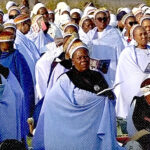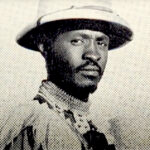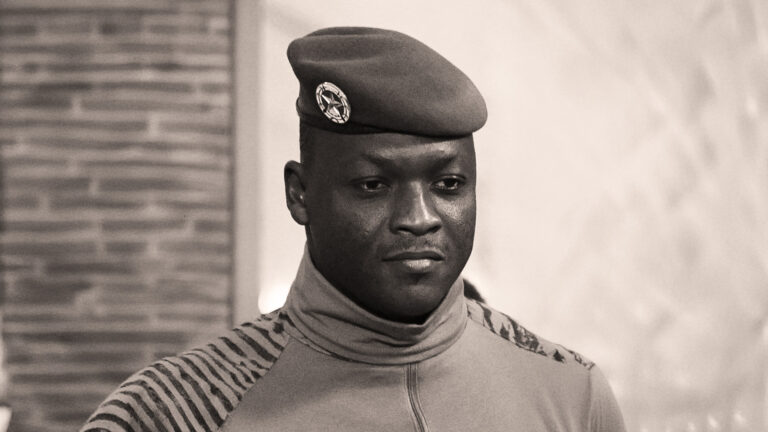Joshua Mhlakela, a self-appointed prophet from Johannesburg, announced that Jesus had personally appeared to him and revealed that the rapture would take place on September 23–24, 2025.
Mhlakela claimed that believers would be taken on those days. When asked why he chose these dates, Joshua pointed to the Jewish festival of Feast of Trumpets, which is celebrated over two days. He explained that his reasoning comes from the pattern of the Jewish feasts: the spring feasts of Passover, Unleavened Bread, and First fruits were fulfilled in Jesus’ first coming, with his death, burial, and resurrection, respectively. Following this logic, Joshua holds that the autumn feasts of Trumpets, Atonement, and Tabernacles point to Christ’s second coming, With the Feast of Trumpets as the first in the sequence of the fall feasts, Joshua connected it to the trumpet sound described in 1 Thessalonians 4:16, which signals the gathering of believers at Christ’s return.
Mhlakela also emphasised that in Matthew 24:36, where Jesus is speaking to Jewish men, he says, “When I return, no one knows the day or hour I will return.” Mhlakela stated that the meaning of this statement comes from a Hebrew idiom. According to him, the phrase “no one knows the day or hour” is referring to the Feast of Trumpets. He added that Google confirms this, if you search the phrase.
Mhlakela’s prophecy first appeared on the podcast Centtwinz TV, hosted by Innocent Sadiki and Millicent Mashile in June 2025. What began as a local interview quickly grew into a global phenomenon. Within weeks, TikTok, YouTube, and X (formerly known as Twitter) were flooded with videos under the hashtag #RaptureTok.
Christ didn’t return. Another prophecy failed.
People across continents began speculating, preparing, and panicking. Some even quit their jobs, sold property, or wrote farewell notes to loved ones. International media outlets, from CNN to the Associated Press, picked up the story. For a brief moment, the world seemed caught in a rapture frenzy not seen in a very long time.
And yet, as the 25th of September dawned, life continued as normal. Christ didn’t return. Another prophecy failed. Another disappointment was added to history’s long list of misguided attempts to know the unknowable.
Failed Prophecies Like #RaptureTok Aren’t New
What happened with Joshua Mhlakela is part of a familiar pattern. For centuries, people have tried and failed to pinpoint the return of Christ. In the 2nd century, Montanus, who believed he was a mouthpiece of God, declared that the New Jerusalem would descend on Phrygia. Like Mhlakela, Montanus assumed that he could predict the timing of divine events but, of course, it did not happen.
People often try to set dates for God’s plans.
In 1844, William Miller predicted Christ’s return in America. Thousands sold their possessions, quit their jobs, and prepared for the Second Coming. When Jesus did not appear on October 22, the event became known as “The Great Disappointment.” While some regrouped to form the Seventh-day Adventist Church, the episode is a clear warning: people often try to set dates for God’s plans. But God’s plans unfold in his time. Faith learns to wait.
In the 20th century, Jehovah’s Witnesses repeatedly predicted the end, each time proven wrong. In 2011, American broadcaster Harold Camping predicted the rapture. Billboards went up, followers emptied bank accounts, and global headlines followed. Nothing happened.
Mhlakela’s prediction is simply the latest entry in this catalogue of failure.
Why Do People Keep Predicting the End?
If Jesus himself said no one knows the day or hour (Mark 13:32), why does this keep happening?
1. The Longing for Certainty
In a world marked by wars, pandemics, and instability, knowing the end feels like gaining control. It promises clarity in the chaos.
2. The Desire for Relevance
Setting dates demands instant attention. A little-known pastor can suddenly become the centre of global conversation.
3. The Neglect of Scripture
When Christians don’t rest in the sufficiency of God’s word, they are drawn to sensational claims of “new revelations.”
4. The New Factor: Social Media
What sets the 2025 #RaptureTok story apart is its speed and reach. Unlike Camping’s 2011 prediction, which spread through radio and billboards, Mhlakela’s prophecy went viral on TikTok, YouTube Shorts, and X. Millions encountered it within days.
The internet amplified the panic.
The internet amplified the panic. Some treated it as a joke. Others spread it with genuine fear. And some made life-altering decisions in response. The combination of a South African podcast, global platforms, and 24-hour news created a perfect storm of “rapture euphoria” not seen in over a decade.
The Danger of False Prophecies
It’s tempting to dismiss all this as harmless speculation. But failed prophecies come with real dangers: scoffers rise in every generation, questioning the hope of believers. As Peter wrote, “They will say, ‘Where is this “coming” he promised? Ever since our ancestors died, everything goes on as it has since the beginning of creation'” (2 Peter 3:4). Every failed prediction of Christ’s return seems to hand them fresh ammunition.
False prophecies wound believers and distort discipleship.
The world mocks the church for its gullibility, and our witness is damaged when we treat speculation as certainty. Instead of fuelling the scoffer’s question, we are called to hold fast to the sure promises of God’s word, which reminds us that the Lord’s timing is not ours, and his promises never fail. Thus false prophecies wound believers. Those who trusted the prophecy feel betrayed, even abandoned by God. Some lose their faith altogether.
False prophecies also distort discipleship. Instead of patient, faithful living, Christians get distracted by calendars and countdowns. False prophecies shift our eyes from Christ to speculation about his timetable.
Lessons for Today
So what can the church learn from the global disappointment of #RaptureTok?
1. Don’t Lose Hope
1 Corinthians 15:20–23 calls Christ’s resurrection the “first fruits of those who have fallen asleep.” Jesus’ rising from the dead guarantees that death has been conquered and that his promise to return is certain. Since the grave couldn’t hold him, he will surely come again to complete what he began.
2. Don’t Look for Dates
Jesus calls us not to predict, but to prepare. “You also must be ready, because the Son of Man will come at an hour when you do not expect him” (Matthew 24:44). Faithful readiness means worshipping God, loving neighbours, and making disciples whether he comes tomorrow or in a thousand years.
3. Trust the Sufficiency of Scripture
Jesus calls us not to predict, but to prepare.
From Montanus to William Miller, Harold Camping, and Joshua Mhlakela, the pattern is the same: they abandon the sufficiency of Scripture, claiming secret revelations and hidden calendars. They treat Revelation as a puzzle to be solved, as if the God-breathed word of God were not enough. But Scripture alone is our authority and the guide God has given us, “everything we need for life and godliness” (2 Peter 1:3). True faith rests not in the conjectures of men, but in the sure promises of God.
Living Between the Times
The New Testament describes the Christian life as waiting with hope, but not passively staring at the sky. We wait actively, pursuing holiness, persevering in faith, and proclaiming the gospel, knowing that the same Jesus who ascended into heaven will surely return (Acts 1:11). So don’t just stand there. Go make disciples. Live faithfully. Be ready.
Every day Christ has not returned is another day of mercy.
Peter explains the so-called delay. “The Lord is not slow in keeping his promise…Instead, he is patient with you, not wanting anyone to perish, but everyone to come to repentance” (2 Peter 3:9). Every day Christ has not returned is another day of mercy.
DON’T HAVE PAYPAL TO SET UP A MONTHLY DONATION? If you would like to donate via Payfast – a secure payment gateway available to donors both inside and outside of Africa – please click here.














